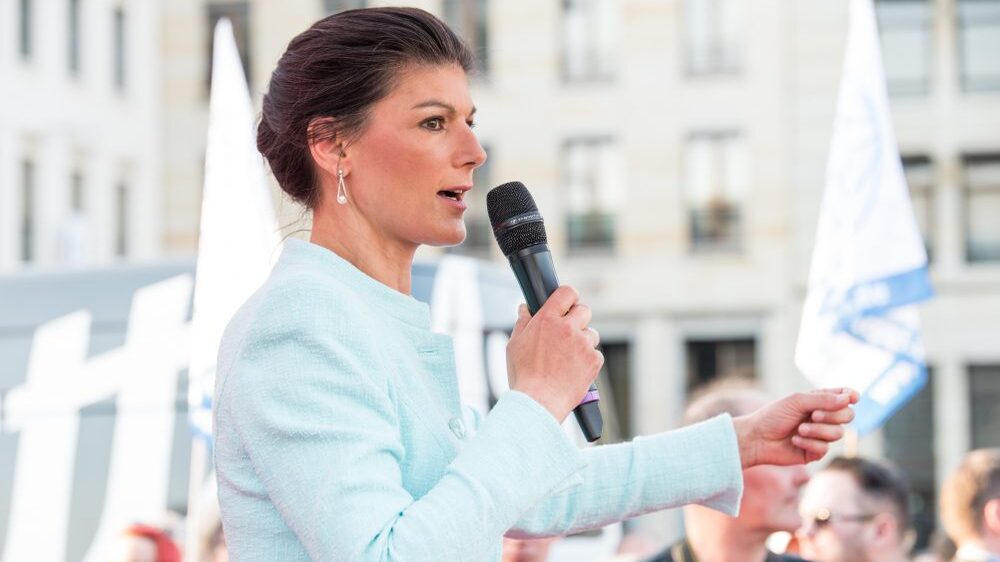
Sahra Wagenknecht.
Photo: Berlin.net/Shutterstock
The former leader of Germany’s Die Linke (The Left) has renounced the possibility of running as a candidate for the party once this legislative period has expired. The announcement has prompted sighs of relief from those in Die Linke’s liberal-globalist camp and fueled speculation that she may found a new party.
Sahra Wagenknecht—a lawmaker for The Left known for her opposition to mass immigration, her objections to sending weapons to Ukraine, and her anti-woke, pro-worker positions—has grown increasingly at odds with much of her party over the years as it’s shifted focus: from issues affecting workers to the politics of gender, identity, climate change, and sexual minorities.
While speaking to the newspaper Die Rheinpalz on Friday, March 3rd, 53-year-old Wagenknecht said: “I rule out running for The Left again,” adding that she will either withdraw from politics entirely or “something new will arise politically.”
In the wake of the interview, Katina Schubert, the deputy leader of The Left and the party’s chairwoman in the state of Berlin, took a swipe at Wagenknecht, claiming that “she hasn’t been doing politics for the Left for a long time” and “has been working on her own account for a long time” as well. Schubert also claimed Wagenknecht’s entire business model is “to agitate against the party, her whole book is based on it.”
Wagenknecht has been committing liberal high heresy since the publication of her book The Self Righteous (Die Selbstgerechten), where she delivered a scathing polemic against many left-wingers—namely those whom she calls “lifestyle leftists”—who she accuses of betraying the working class and abandoning the traditional left-wing economic position.
In the book, Wagenknecht voices her opposition to the sacred leftist cow that is migration, writing,
they talk about immigration as a great asset, but at the same time they work hard to ensure that their own children go to schools where they only get to know other cultures through literature or art classes.
Wagenknecht, in the book, offers a rare, left-wing criticism of “lifestyle leftists” for regarding
the nation-state to be an obsolete model and [him or herself] a citizen of the world who has little in common with his own country. [They deem] traditional values such as performance, diligence, and effort uncool.
She has also accused these “lifestyle leftists” of having “no empathy and no respect.”
The Russo-Ukrainian War has only caused the ideological rift between Wagenknecht and many inside her party to deepen. For describing Germany and the collective West’s sanctions against Russia as an “unprecedented economic war,”—and for suggesting the sanctions were inflicting great harm on Germany and its working-class—Wagenknecht was denounced by the party’s leadership in a parliamentary session.
A 2/25 rally in Berlin led by Left Party’s Sahra Wagenknecht brought tens of thousands of Germans together in support of a peace manifesto signed by 670,000 people
— Max Blumenthal (@MaxBlumenthal) February 27, 2023
“We don’t want German tanks firing on the great-grandchildren of Russian women and men!”pic.twitter.com/dbiSQS7q8U
Wagenknecht and Alice Schwarz, a prominent, long-time writer and feminist campaigner co-wrote a “Manifesto for Peace” which 700,000 people signed, including German politicians, academics, intellectuals, and activists. Late last month, the two women held an anti-war demonstration in Berlin which saw between 13,000 and 50,000 people from across the political spectrum participate.
Demo von Alice #Schwarzer und Sahra #Wagenknecht gegen #Waffenlieferungen am Brandenburger Tor in Berlin #b2502 #Wagenknecht_und_Schwarzer pic.twitter.com/iIdrYJAIJu
— dts Nachrichtenagentur (@dts_nachrichten) February 25, 2023
For years, in light of her great popularity among voters of the Left Party and Alternative für Deutschland (AfD), especially in eastern Germany, rumors have consistently circulated that Wagenknhecht would form her anti-establishment party that sits out the traditional Left-Right spectrum.
A new party created by Wagenknecht could garner up to 19% of the vote, according to an opinion survey from Kantar. The polling figures indicate that Wagenknecht would draw significant support from The Left, AfD, and the FDP, at 50%, 60%, and 26% respectively.
Despite her unique appeal and broad popularity that flies in the face of the traditional—some might go so far as to say antiquated—Right-Left political spectrum, it remains unclear whether Wagenknecht will establish a party.
To gain a better understanding of the contours of Germany’s highly dynamic political situation in which the old Right-Left paradigm is increasingly obsolete, read “Boris Palmer, Sahra Wagenknecht, and Hans-Georg Maassen: A Tale of Three German Politicians” by Sharon K. Higby, a senior editor for The European Conservative.
